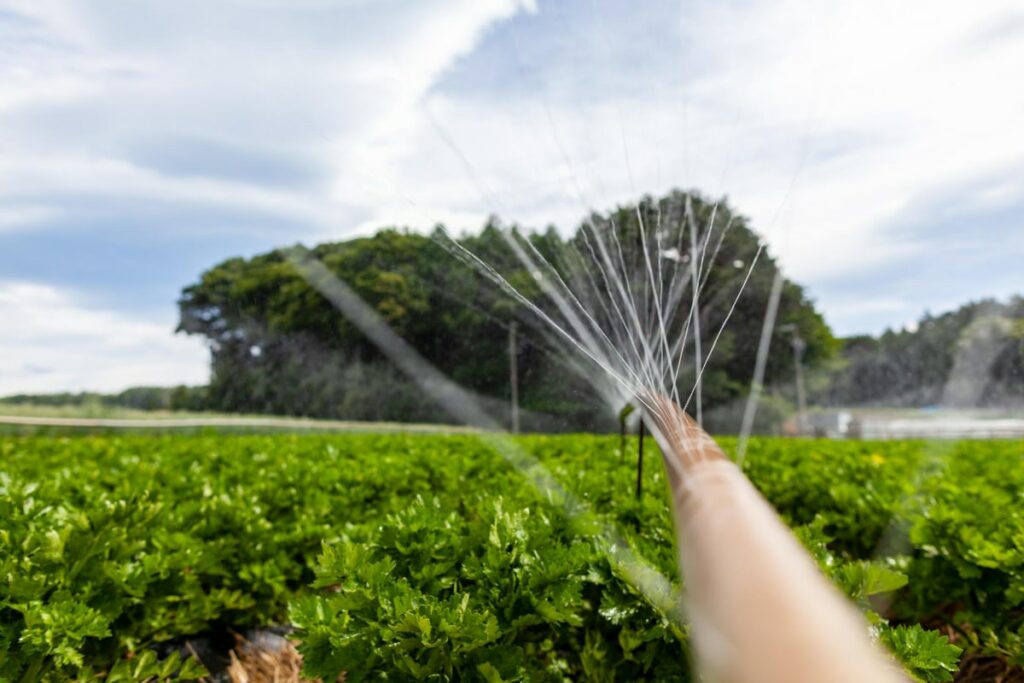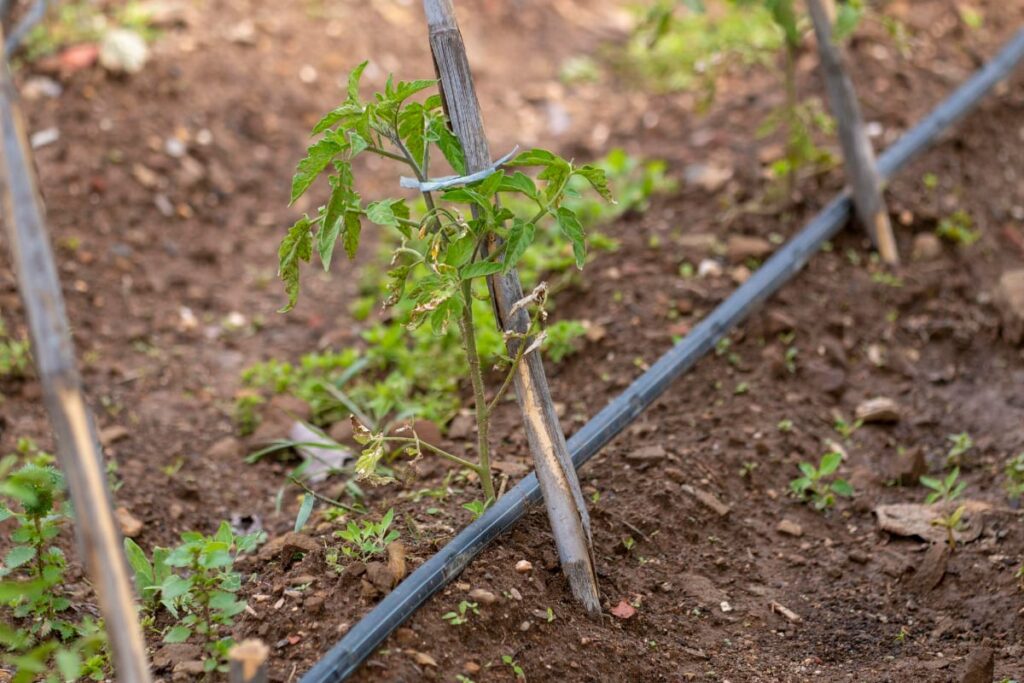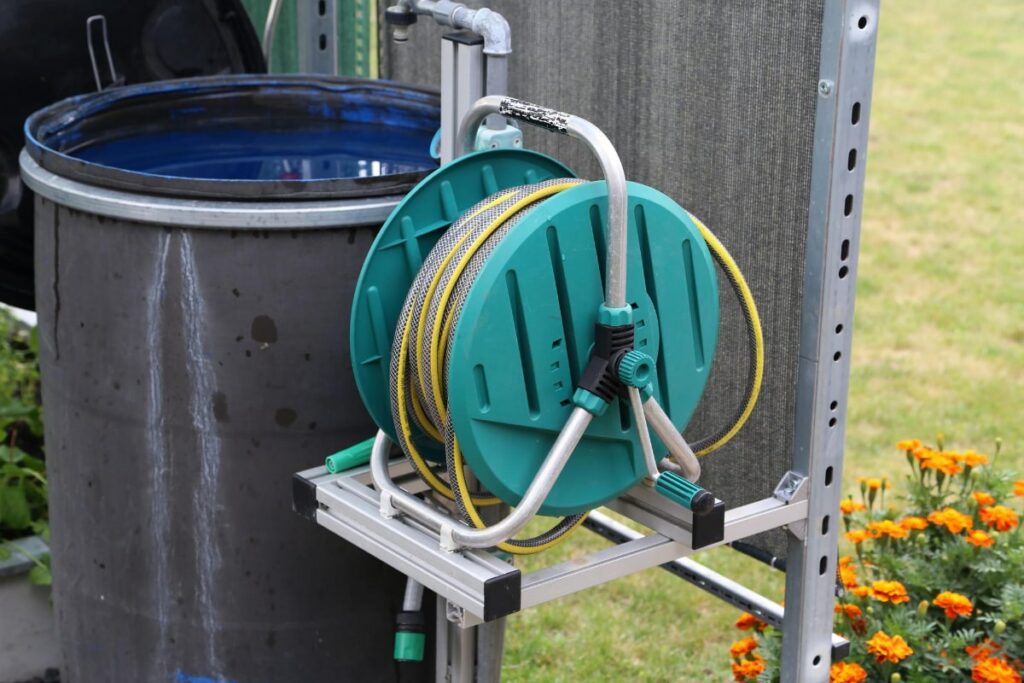Do you love growing fresh vegetables in your vegetable garden? Growing your own vegetables is fun, healthy, and cheap. But how often should you water your garden?
There’s a lot of conflicting information online about how often to water vegetable gardens. Some say every day, others say once a week, and still others say never.
I’ve been growing vegetables for over 12 years now, and it’s taken a lot of trial and error to successfully grow delicious vegetables every time.
In this article, I’ll explain the various factors that will determine how often to water your vegetable garden.

How Often Should You Water a Vegetable Garden?
Compared to many other garden plants, trees, and shrubs, vegetables are quick-growing and need regular watering. Giving your vegetables the right amount of water can drastically improve your crop yield and the health of your plants.
Watering your vegetable garden once every 1-2 weeks is ideal, but how often within that range will depend on a number of things. Vegetable plants need about one inch of water per week for healthy growth.
How often you water your vegetable garden depends on several factors. These factors include
- How old your plants are.
- The weather conditions.
- The type of soil you have.
- The type of vegetables you are growing.
Generally speaking, giving your plants a really good soak every week or two is better than giving them a little bit of water every day.
Watering a little water frequently leads to shallow watering, so the water won’t be able to penetrate too deep. That means the vegetable plant roots will stay close to the soil surface, which can lead to the roots drying out quickly.
This method means less frequent watering but really saturating the soil when you do water because you want the water to soak down to the roots of your plant and not just sit in the top layer of soil.
How Much Water Do Vegetables Need?
This question also has various answers depending on many factors.
Most vegetables will need around one to two inches of water a week, but different veggies will require different amounts at different times. Weather is also a factor. If you have had two inches of rain that week, then you don’t need to water your plants at all!
What Vegetables Did You Plant?
I’ve broken this down into different vegetables to give you an overview of a selection of varying vegetables likes to be watered.
Most vegetables need extra water when going through growth cycles, and some leafy vegetables will bolt in prolonged periods of drought.
Below are a few vegetables that have specific water requirements.
- When they are young, it’s best not to water legumes too much as this can encourage leafy growth instead of pods. To get the most out of your legumes, give them lots of water when they are flowering.
- Courgettes need continual moisture throughout their lifecycle.
- Squash needs substantial watering. However, trailing types act as their own mulch and will keep the soil moist with their large leaves, which means they don’t need to be watered as often.
- Tomatoes need regular and consistent watering, as infrequent watering can lead to the tomatoes splitting.
- Fruiting crops need plenty of water throughout the flowering and fruiting periods.
- Root crops need less watering, as you want to encourage root growth. Give them a really good soak every two weeks if there has only been a little rain.
- Onions only need water when they are getting established or if it has been particularly dry.
What Watering Tools are You Using?
It is important to water your plants correctly. Most experts will recommend only watering the base of your plants and avoiding excess water landing on the foliage.
This recommendation is due to the increased chance of fungal disease when the leaves are moist.
Most gardeners will rely on a hose or a watering can – both of which can be effective, although the watering-can can be a little labor-intensive.
Many gardeners are now turning to drip irrigation systems that slowly water the plant’s roots. You can buy timed systems that hook up to a water supply, or you can poke holes in a hosepipe, lay it in your vegetable patch, and attach it to a water-butt or water supply.
However, if you are not using a timed system, don’t forget to turn off the tap!

How Wet is the Soil?
If you are unsure if your plants need water, the best way to check is with your hands. Feel the soil; if it feels damp, you probably don’t need to water them just yet. If the soil is dry, give it a good long soak.
With this method, you can’t just feel the top of the soil. The dampness of the soil is best assessed about 10-11” down, as this is where the roots are.
The best way to check the soil is to push a trowel or spade into the ground and tilt it to look at the soil underneath. Alternatively, you could use a wooden dibber or some doweling which you can push down into the soil and check how damp the end is when it’s removed.
How Much Has it Rained?
Weather is the number one determining factor for how often you need to water your plants and how much they need.
It can be handy to keep a rain measurement tool, so you know exactly how much water your plants have got, although feeling the soil is sufficient.
The obvious exception is if you have a greenhouse or a poly-tunnel. As the rain won’t fall directly onto the soil, you must keep up regular watering whatever the weather.
Plants in pots can also dry out quickly despite frequent downpours, so keep a close eye on vegetables in pots or grow bags.
How Well Does Your Soil Drain?
If you have sandy soil, you may find that you need to water your garden more often. Sandy soil does not hold moisture well, and water will drain away pretty quick, requiring regular top-ups.
In contrast, clay soil benefits from less watering, as the cracks that appear in dry clay are essential for aeration and drainage. Excessive watering in clay soil can lead to the plants becoming water-logged.
Are You Using Raised Beds?
Raised beds will usually drain faster than vegetable beds that are directly in the ground. This feature can have benefits, but it does mean you will have to water them more often.
During particularly dry or hot periods, you may have to water your raised beds as much as twice a day.
How to Water a Vegetable Garden
While it is best to water your vegetable garden with rainwater that has been harvested in a water bucket (also known as a water butt), that isn’t always practical – especially if you have a large garden.
Lugging around a watering can is hard work and time-consuming, which is why most people resort to using a hose connected to the main water supply.
However, you can rig up an irrigation system that connects to a water butt. I connected hoses to the tap of my water butts. I poked small holes in the hoses at regular intervals and laid them between the rows of vegetables. The butt is raised, so when I turn on the tap, gravity does all the work, and my plants can get a good soak.
Having raised water butts isn’t always the best way of doing it, and you can get a water pump that sits inside the water butt, like in this option. However, I recommend using a hose with holes rather than a sprinkler to keep the water lower at the base of plants.
While it might seem logical to sprinkle water over a large area, the water will land on the foliage rather than being concentrated at the roots.
Below are some tips on how to water your vegetable garden.
- Water first thing in the morning. If you water during the day, some water will evaporate before it soaks into the roots. Watering in the evening is okay, but you increase the chance of water sitting on the leaves overnight if you accidentally splash water on the foliage. By watering in the morning, any water droplets on the plant will dry off during the day.
- Aim your hose or can at the base of the plant. This way, you can get as much water as possible directly into the soil.
- Give your plants a really good soak every two weeks, stepping up the watering during growth periods that are specific to the plant.
- Use rainwater where you can.
Can You Overwater a Vegetable Garden?
Yes, you can definitely overwater vegetables. Issues from over-watering include excess leafy growth, which is great for lettuce, but will result in a reduced crop in other vegetables and splitting in carrots.
Slugs and snails love damp conditions too, so overwatering can encourage these little critters into your vegetable garden.
Root rot is also a common side effect of overwatering, as the roots sit in water for too long. A fungal infection called foot rot can also be caused by excess moisture in the soil.
Can I Water My Vegetable Garden at Night
There is no reason your vegetable garden can’t be watered at night. The water will be able to soak into the soil for the plant’s roots to absorb during the day.
If your choice is between watering at night or watering in the middle of the day, the night would be preferable and better for your plants.

How Often to Water Your Vegetable Garden Final Thoughts
In general, water your vegetable garden every 1-2 weeks, but also consider other factors that can adjust how often to water. It depends on what kind of vegetable garden you have and whether you want to grow fast-growing crops or slower growing ones.
If you are new to gardening, then start out with smaller gardens and gradually build up until you reach the size of your current one. In addition, don’t forget about the surrounding areas around your garden. It may not look like much now, but there could be a lot of growth in the future.
Learn more about vegetable gardens:



